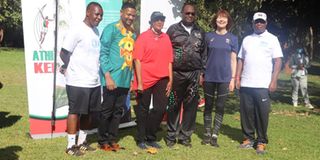Air quality: Where nature meets sports

From left to right: SEI Africa Centre Director Dr Philip Osano, UNEP Africa Regional Climate Change Coordinator Richard Munang, Sports Cabinet Secretary Amina Mohamed, Environment Principal Secretary Dr Chris Kiptoo, World Athletics Council Member Sylvia Barlag and Athletics Kenya President Gen Jackson Tuwei pose for a photo after a run that commemorated UNEP's 50 years at Karura Forest, Nairobi on March 4, 2022.
Ever wondered where nature and sports meet? Well, in an athletics event that brought together over 100 runners at Karura Forest, it turned out that if sportspeople breathed dirty air, then they wouldn’t perform at their top potential.
The 10-kilometre Karura Run event, organised in commemoration of the United Nations Environment Programme (UNEP)’s 50 years of global environmental protection awareness stressed on the need to clean the air around sports grounds.
The early morning event was organised in partnership with the Stockholm Environment Institute (SEI), World Athletics, Athletics Kenya and the Ministry of Environment.
Cabinet Secretary for Sports Ms Amina Mohamed illustrated how nature and sports have become inseparable noting that mass planting of trees is an initiative that has to be supported.
Plant 19 million trees
“Forests give us fresh breath. All athletics and safari rally events have tree planting sessions. We target to plant 19 million trees, we have planted 1.5 million trees so far,” she said.
Africa Regional Climate Change Coordinator at UNEP Richard Munang said that it has become inevitable to create a world of harmony with nature.
Noting that 99 per cent of the global population breathes dirty air, he called for the end to mass deforestation.
“10 million hectares of land is being destroyed. We have to stop this by raising awareness on the need of creating a better planet and making sure we take care of our nature,” he said.
With rampant environmental destruction of nature contributing to the current climate change crisis, he called for humane treatment of natural resources as all life depends on it.
“When we work with nature and not against it, it can forgive us,” he said.
Ms Sylvia Barlag, World Athletics Council Member emphasised that air quality is a critical component in not only the success of athletes but the survival of humankind.
“We cannot ignore nature's ability to purify this air. Every time you run you improve breathing by 400 times. An additional dimension for the care of the environment is our empathy towards nature,” she said.
Purifying air
The former chair of the World Athletics Council's Sustainability Working Group spearheaded a project that has seen air quality monitoring devices installed at the Moi International Sports Centre in Nairobi and Nyayo Stadium.
SEI’s Africa Centre Director Dr Philip Osano said purifying atmospheric air remains one of his organisation's goals in reducing carbon emissions by 30 per cent by 2030.
Greenhouse gas concentrations reached new highs in 2020, with globally averaged mole fractions of carbon dioxide exceeding 410 parts per million according to the United Nations.
Environment and Forestry Principal Secretary Dr Chris Kiptoo, who flagged the UNEP run, said the ministry is planning to prepare all forests in Kenya for sporting activities.
Environmental conservation
“We have 800 green spaces in Nairobi to restore for public use. We want to ensure sportspeople enjoy the track by breathing the best air,” Dr Kiptoo said.
Athletics Kenya was commended for being the first signatory in the world, out of over 160 countries, to contribute significantly to UNEP goals on environmental conservation.
“Athletes need good and clean air to perform well and that is why we were the first federation to commit ourselves,” said Athletics Kenya President Jackson Tuwei.
Renowned athletes who graced the occasion are William Tanui, Hellen Obiri, Milcah Chemos, Tegla Loroupe, Timothy Cheruiyot and Douglas Wakiihuri.





